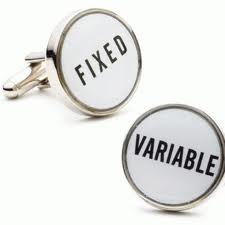
One of the most common questions a group7 Finance Consultant answers is, "should I choose a fixed or adjustable rate mortgage (ARM)?" The answer depends on many different factors including your income at the time of qualifying, the lender you are working with, current market conditions and how long you plan to stay in the house.
Let’s talk about your income first. Many first time buyers who are in the beginning stages of their careers will choose an adjustable rate over a fixed rate. The main reason is that, while the interest rate on the adjustable will likely increase over the coming years, the borrowers’ level of income can outpace the increased monthly payments. For this reason, adjustable rates tend to be the loan of preference for new college graduates who are beginning work in the field they studied. On the opposite end of the spectrum are high-income borrowers and real estate investors. These people tend to prefer adjustable rates because of the opportunity to make reduced monthly payments. High-income borrowers will then either invest the difference between the fixed rate and ARM payments, or use the starting period when the rate is very low to apply large amounts of money to the principle balance. This will enable them to pay off the loan faster and minimize future payment increases since they will be financing less money.
Because of the lower initial interest rate, adjustable rates result in a lower mortgage payment than the standard fixed-rate mortgage. This lower monthly mortgage payment can assist a borrower with high debt ratios in qualifying for a larger mortgage. This allows a borrower to increase their purchasing power in order to buy a more expensive home.
If your income is not an issue, the next thing to consider is the lender that you choose for your loan. Some lenders actually prefer to write adjustable rate loans because, over the long run, it will provide them with more interest income. Because there is an additional profit in the loan, ARM lenders may make it easier for you to qualify. This is where we can be particularly helpful. Because group7 Finance Consultant work closely with many lenders, they know which lenders prefer to do fixed or adjustable rate loans and can steer your loan in the proper direction.
Another issue to consider is the current real estate market conditions. When interest rates are down, many lenders are apprehensive to offer ARM’s because it is more difficult to find investors. The opposite is also true when interest rates are higher. This is also an area where a group7 Finance Consultant can be particularly helpful since they are actively engaged in the real estate market and know the current trends.
The last issue to consider in deciding between fixed and adjustable rates is how long you intend to occupy the property. As a general rule of thumb, most people will be better off with a fixed rate if they plan to be in the property for more than five years. At that point, your interest rate for an ARM will usually have increased substantially so your payment will be much higher than if you had taken a fixed rate. On the other hand, if you are planning to stay less than 5 years, then the thought of buying 30-year money is probably not very appealing. Also, as we have already discussed, if you put extra money to principle when your interest rate is low it will help to keep large payment fluctuations in check. You should also consider that adjustable rate mortgages have built in safety measures known as "caps" that will help limit how high your interest rates can rise per year. Most adjustable rates are structured so that the annual interest rate cannot rise by more than 2 percent per year, although some loans have caps that are even more conservative. Other loans will not regulate the interest rate at all but instead limit how high the payment can rise each year. You should consult with a group7 Finance Consultant to help you determine if a fixed or adjustable rate loan is right for you.
Let’s talk about your income first. Many first time buyers who are in the beginning stages of their careers will choose an adjustable rate over a fixed rate. The main reason is that, while the interest rate on the adjustable will likely increase over the coming years, the borrowers’ level of income can outpace the increased monthly payments. For this reason, adjustable rates tend to be the loan of preference for new college graduates who are beginning work in the field they studied. On the opposite end of the spectrum are high-income borrowers and real estate investors. These people tend to prefer adjustable rates because of the opportunity to make reduced monthly payments. High-income borrowers will then either invest the difference between the fixed rate and ARM payments, or use the starting period when the rate is very low to apply large amounts of money to the principle balance. This will enable them to pay off the loan faster and minimize future payment increases since they will be financing less money.
Because of the lower initial interest rate, adjustable rates result in a lower mortgage payment than the standard fixed-rate mortgage. This lower monthly mortgage payment can assist a borrower with high debt ratios in qualifying for a larger mortgage. This allows a borrower to increase their purchasing power in order to buy a more expensive home.
If your income is not an issue, the next thing to consider is the lender that you choose for your loan. Some lenders actually prefer to write adjustable rate loans because, over the long run, it will provide them with more interest income. Because there is an additional profit in the loan, ARM lenders may make it easier for you to qualify. This is where we can be particularly helpful. Because group7 Finance Consultant work closely with many lenders, they know which lenders prefer to do fixed or adjustable rate loans and can steer your loan in the proper direction.
Another issue to consider is the current real estate market conditions. When interest rates are down, many lenders are apprehensive to offer ARM’s because it is more difficult to find investors. The opposite is also true when interest rates are higher. This is also an area where a group7 Finance Consultant can be particularly helpful since they are actively engaged in the real estate market and know the current trends.
The last issue to consider in deciding between fixed and adjustable rates is how long you intend to occupy the property. As a general rule of thumb, most people will be better off with a fixed rate if they plan to be in the property for more than five years. At that point, your interest rate for an ARM will usually have increased substantially so your payment will be much higher than if you had taken a fixed rate. On the other hand, if you are planning to stay less than 5 years, then the thought of buying 30-year money is probably not very appealing. Also, as we have already discussed, if you put extra money to principle when your interest rate is low it will help to keep large payment fluctuations in check. You should also consider that adjustable rate mortgages have built in safety measures known as "caps" that will help limit how high your interest rates can rise per year. Most adjustable rates are structured so that the annual interest rate cannot rise by more than 2 percent per year, although some loans have caps that are even more conservative. Other loans will not regulate the interest rate at all but instead limit how high the payment can rise each year. You should consult with a group7 Finance Consultant to help you determine if a fixed or adjustable rate loan is right for you.


